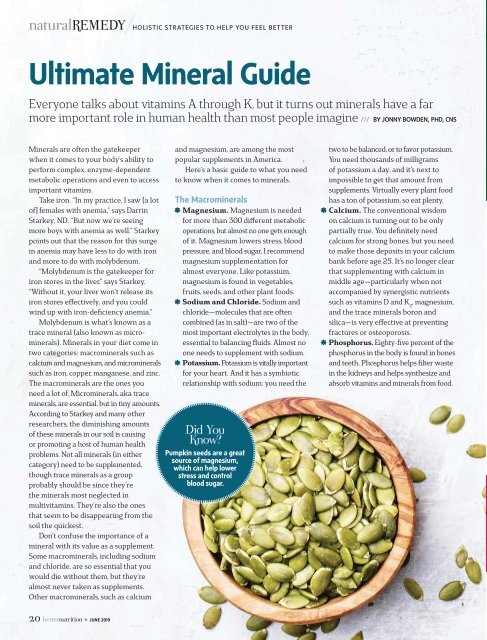Better Nutrition June 2019
You also want an ePaper? Increase the reach of your titles
YUMPU automatically turns print PDFs into web optimized ePapers that Google loves.
naturalREMEDY/HOLISTIC STRATEGIES TO HELP YOU FEEL BETTER<br />
Ultimate Mineral Guide<br />
Everyone talks about vitamins A through K, but it turns out minerals have a far<br />
more important role in human health than most people imagine /// BY JONNY BOWDEN, PHD, CNS<br />
Minerals are often the gatekeeper<br />
when it comes to your body’s ability to<br />
perform complex, enzyme-dependent<br />
metabolic operations and even to access<br />
important vitamins.<br />
Take iron. “In my practice, I saw [a lot<br />
of] females with anemia,” says Darrin<br />
Starkey, ND. “But now we’re seeing<br />
more boys with anemia as well.” Starkey<br />
points out that the reason for this surge<br />
in anemia may have less to do with iron<br />
and more to do with molybdenum.<br />
“Molybdenum is the gatekeeper for<br />
iron stores in the liver,” says Starkey.<br />
“Without it, your liver won’t release its<br />
iron stores effectively, and you could<br />
wind up with iron-deficiency anemia.”<br />
Molybdenum is what’s known as a<br />
trace mineral (also known as microminerals).<br />
Minerals in your diet come in<br />
two categories: macrominerals such as<br />
calcium and magnesium, and microminerals<br />
such as iron, copper, manganese, and zinc.<br />
The macrominerals are the ones you<br />
need a lot of. Microminerals, aka trace<br />
minerals, are essential, but in tiny amounts.<br />
According to Starkey and many other<br />
researchers, the diminishing amounts<br />
of these minerals in our soil is causing<br />
or promoting a host of human health<br />
problems. Not all minerals (in either<br />
category) need to be supplemented,<br />
though trace minerals as a group<br />
probably should be since they’re<br />
the minerals most neglected in<br />
multivitamins. They’re also the ones<br />
that seem to be disappearing from the<br />
soil the quickest.<br />
Don’t confuse the importance of a<br />
mineral with its value as a supplement.<br />
Some macrominerals, including sodium<br />
and chloride, are so essential that you<br />
would die without them, but they’re<br />
almost never taken as supplements.<br />
Other macrominerals, such as calcium<br />
and magnesium, are among the most<br />
popular supplements in America.<br />
Here’s a basic guide to what you need<br />
to know when it comes to minerals.<br />
The Macrominerals<br />
* Magnesium. Magnesium is needed<br />
for more than 300 different metabolic<br />
operations, but almost no one gets enough<br />
of it. Magnesium lowers stress, blood<br />
pressure, and blood sugar. I recommend<br />
magnesium supplementation for<br />
almost everyone. Like potassium,<br />
magnesium is found in vegetables,<br />
fruits, seeds, and other plant foods.<br />
* Sodium and Chloride. Sodium and<br />
chloride—molecules that are often<br />
combined (as in salt)—are two of the<br />
most important electrolytes in the body,<br />
essential to balancing fluids. Almost no<br />
one needs to supplement with sodium.<br />
* Potassium. Potassium is vitally important<br />
for your heart. And it has a symbiotic<br />
relationship with sodium: you need the<br />
Did You<br />
Know?<br />
Pumpkin seeds are a great<br />
source of magnesium,<br />
which can help lower<br />
stress and control<br />
blood sugar.<br />
*<br />
*<br />
two to be balanced, or to favor potassium.<br />
You need thousands of milligrams<br />
of potassium a day, and it’s next to<br />
impossible to get that amount from<br />
supplements. Virtually every plant food<br />
has a ton of potassium, so eat plenty.<br />
Calcium. The conventional wisdom<br />
on calcium is turning out to be only<br />
partially true. You definitely need<br />
calcium for strong bones, but you need<br />
to make those deposits in your calcium<br />
bank before age 25. It’s no longer clear<br />
that supplementing with calcium in<br />
middle age—particularly when not<br />
accompanied by synergistic nutrients<br />
such as vitamins D and K 2<br />
, magnesium,<br />
and the trace minerals boron and<br />
silica—is very effective at preventing<br />
fractures or osteoporosis.<br />
Phosphorus. Eighty-five percent of the<br />
phosphorus in the body is found in bones<br />
and teeth. Phosphorus helps filter waste<br />
in the kidneys and helps synthesize and<br />
absorb vitamins and minerals from food.<br />
20 • JUNE <strong>2019</strong>

















